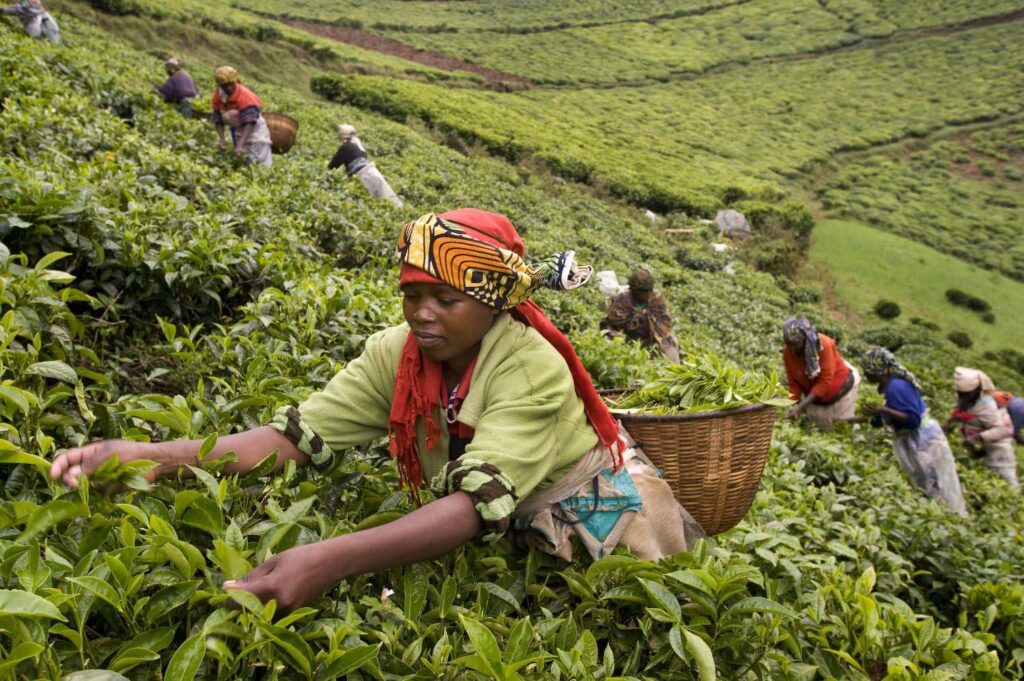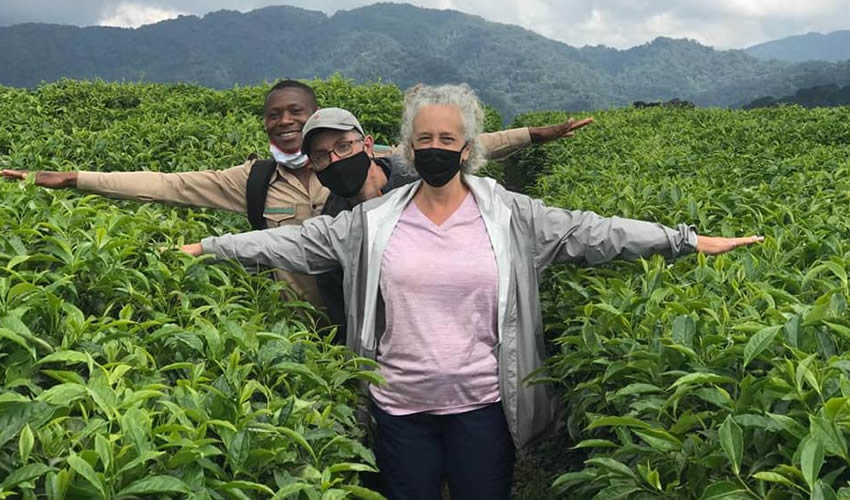Touring Tea Plantations In Rwanda
Touring Tea Plantations In Rwanda: The country of Rwanda, known for its stunning scenery and dynamic culture, is home to enthralling tea plantations that have grown to be a prominent tourist destination. Rwanda‘s history dates back to 1952, when tea was first brought to the nation. Since then, it has been a major player in the worldwide tea market. There are now 18 tea production lines and 24,000 hectares of tea plantations due to the optimal growing environment for tea provided by the fertile volcanic soil and suitable climate. These farms provide guests with a singular chance to observe the full tea-making process, take in the gorgeous surroundings, and learn more about the rich history and culture of Rwanda. This piece will discuss the attraction of Rwanda’s tea plantations, their economic value, and the estates that are a must-see when visiting Nyungwe Forest National Park.

The Enchanting Tea Plantations: Situated amidst tumbling slopes, Rwanda‘s tea plantations offer an incredibly attractive landscape that makes an enduring effect on tourists. The following justifies including a visit to a tea plantation on your Rwanda itinerary:
Enchanting Natural Beauty: The vast tea bushes stand out against the blue skies, country paths, and copious amounts of sunlight as you go over the undulating hills. The rich vegetation of the tea plantations, which are lovingly maintained by committed laborers, creates a tranquil and enthralling atmosphere. The visual attraction of the surrounding area is further enhanced by the plantations’ close vicinity to Nyungwe Forest National Park, which is renowned for its biodiversity and natural beauty. This allows visitors to observe the peaceful coexistence of cultivated tea and pristine wildness.
Experience Learning: Seeing a tea plantation is an amazing way to discover the craft of producing tea, from growing the leaves to processing them. Learn about the farming methods used, see the careful picking of tea leaves, and see the laborers who put their skills to use in making this popular drink. Experience Rwanda‘s rich history and cultural significance around tea as you engage with the people who have devoted their life to growing and manufacturing this wonderful beverage.

Contribution to the Local Economy: Rwanda‘s economy depends heavily on the production of tea, even aside from its value as a tourist destination. The tea business, which contributes 1% of the nation’s GDP per year, is a major force behind economic expansion and job creation. Through supporting the local economy and touring the tea farms, tourists help Rwanda develop sustainably by uplifting communities and encouraging self-sufficiency.
Need toIn the vicinity of Nyungwe Forest National Park, visit tea estates: Here are three renowned farms that ought to be on your schedule if you want to enjoy tea plantations to the fullest:
Gisakura Tea Estate: One of
‘s most well-known and aesthetically spectacular farms, the Gisakura Tea Estate is located along the rolling hills on the western edge of Nyungwe Forest National Park. The carefully planned tea lines provide a striking contrast to the scenic surroundings. To experience the distinctive flavors of Rwanda‘s well-known tea, guests can partake in cupping sessions, explore the estate’s grounds, and join guided tours. The estate provides lodging for those who have more time, enabling you to really experience the peace and beauty of the area.
Gisovu Tea Estate: Surrounded by meandering roads and glittering tea fields, the Gisovu Tea Estate is situated at the northern boundary of Nyungwe Forest National Park. The strategic location of the estate creates a dramatic contrast between the wild grandeur of the nearby forest and the well-organized tea lines. Visitors can take leisurely walks around the estate or explore the trails of Nyungwe Forest National Park in addition to guided tours and tea tastings. Enjoying mugs of the best tea on the planet while soaking up the tranquil Rwandan nights is a memorable experience.
Gatare Tea Estate: The breathtaking hills, expansive vistas of the forest, and the commanding presence of Mount Muzimu and the Congo Nile enthrall visitors to this serene estate, which is tucked away close to Nyungwe Forest National Park. The estate offers a chance to learn more about the history and cultural legacy of the area in addition to showcasing the elegance of tea growing. In addition to learning about the tea-making process and interacting with the local staff, visitors can take part in guided tours. Gatare Tea Estate is a must-visit location for nature lovers and tea connoisseurs alike because of its harmonious fusion of natural beauty and cultural immersion.

Exploring Rwanda‘s tea estates reveals a world rich in cultural value, natural beauty, and economic relevance. Tea manufacturing and cultivation are an art form that you will come to appreciate even more as you explore the rolling hills covered with luscious tea bushes. These plantations not only provide gorgeous scenery but also act as a catalyst for economic expansion, generating jobs and advancing Rwanda‘s development. You may boost the local economy and promote a better knowledge of Rwanda‘s dynamic culture and rich history by going on a tour of these tea estates. Take a trip inspired by tea and use the breathtaking views of Rwanda‘s tea farms to create a lasting impression on your travels through this amazing nation.



